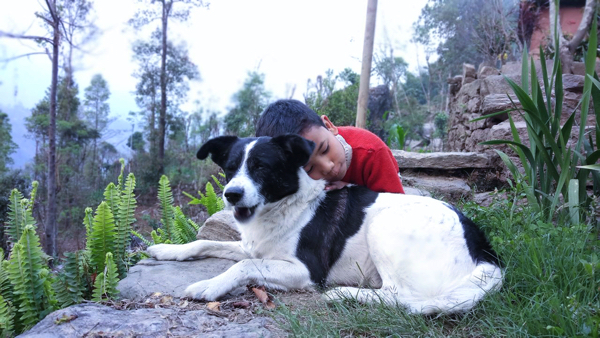
Wri/Dir: Saurav Rai | With: Pravesh Gurung, Chandra Dewan, Suni Rai, Teresa Rai, Digbijay Singh Rai | Drama India, 85′
There is a farcical nature to this quirky human drama set in rural Darjeeling where a war of attrition plays out between a boy and the feudal landowner who puts a roof over his head. The humour is offbeat but appealing.
Based on the filmmaker’s own experiences growing up in a village in West Bengal near Darjeeling, Saurav Rai’s family make up the cast and provide naturalistic performances along with the local people. Invitation (Nimtoh) sees its 10-year-old protagonist Tashi being naughty and spiteful from the outset when he is tasked with delivering wedding invitations on behalf of the landowner he works for. Not only does he throw some of the invites away, but he also shouts rudely at their intended recipients. Apparently one complained about him stealing a guava from a tree on their property. But this does not endear us to Tashi, despite his lament. The strange thing about the characters is that everyone looks poverty-stricken and disheveled by western standards – even the landowner’s house is a meagre rambling place with crumbling interiors, and he is forced to milk his own cow – so we don’t particularly have sympathy for the underdogs whose life appears to runs on similar lines to their overlords – on the surface of it.
All that said, Invitation is certainly a breath of fresh air with its irreverent humour and unpredictable storyline. Tashi attends the local school and is seen disappearing down the hillside but clearly wants an easier life. His old granny is certainly not to be messed with as she rushes around the hillside banging a tin dinner bowl at the slightest opportunity. Although set in the present there a feeling of being in the past, and a beguiling one, the exotic landscapes of the tea plantation off-season give the film a lush and verdant backcloth. Clearly Tashi has had a difficult start in life, but nothing is said of his parents of siblings.
Tashi and his grandmother live in a tithe dwelling opposite the old man and his wife but must service them by doing odds jobs. The son who is going to be married seems ambivalent about it all, but goes along with his parent’s plans. Family and staff seem to muck in together, Tashi sneaking into his master’s living room to watch TV, the old man pulling rank by quickly turning over the channel to something more serious. Although the film often cues the audience how to feel about a little Tashi, he’s not a particularly likeable child and neither is his grandmother.
The wedding is a desultory affair that once again seems low key and disorganised, and we wonder if it will happen at all. The son is a portly young city boy, his bride encumbered by her traditional costume seems keener to have a cigarette and get back to the city, rather than join him on their wedding night. In fact the only thing the couple are wedded to are their jobs. Tashi wants to be there for the nuptials but is made busy collecting pig fodder, which he then throws away. Another subversive trick to needle the old landowner and his wife.
Later Tashi is seen tied to a tree in the nearby wooded hillside so clearly more naughtiness has gone on in the interim, although quite what, seems almost insignificant by this stage in the game. This enigmatic approach to the narrative does not always work in the film’s favour but the quirky tone lets things ride for the most part as there is plenty to admire in the glorious locations and random goings on, making our understanding of the cultural significance less and less clear. The accent here is on the laidback nature of this tight community locked between the past and the future in a rural idyll. MT
ROTTERDAM INTERNATIONAL FILM FESTIVAL 2020